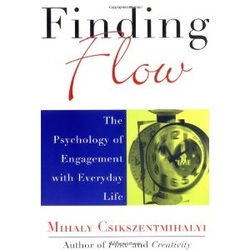
A small book with a great doses of practical information about how to transform daily life by making it more engaging. The key? Challenging ourselves with tasks requiring a high degree of skill and commitment.
Some ideas I would like to highlight:
About quality of life: "The quality of life does not depend on happiness alone, but also on what one does to be happy. If one fails to develop goals that give meaning to one's existence, if one does not use the mind at its fullest, then good feelings fulfill just a fraction of the potential we posses." (P.22).
About creative people: "Creative people are especially good at ordering their lives so that what they do, when, and with whom will enable them to do their best work. If what they need is spontaneity and disorder, they they make sure to have that, too."
"Most creative persons don't follow a career laid out for them, but invent their job as they go along." (P.107).
About Flow at work: "Because for most of us a job is such a central part of life, it is essential that this activity be as enjoyable and rewarding as possible. Yet many people feel that as long as they get decent pay and some security, it does not matter how boring or alienating their job is. Such an attitude, however, amounts to throwing away almost 40% of life." (P. 101). There are three main reasons, according to the author that jobs may be resented: When the job is pointless (it does no good to anyone); when the work is boring and routine (it provides no challenge); when jobs are stressful (especially when one can't get along with one's supervisor or colleagues who expect too much or do not recognize one's contributions).
But the author also adds, about it: "Even if we don't want to admit it, the ability to overcome most obstacles is within our hands.(...) It is always a better deal to do something one feels good about than something that may make us materially comfortable but emotionally miserable. Such decisions are notoriously difficult and require great honesty with oneself." (P. 102).
But there are also "great ways to make one's job more meaningful by adding value to it. (...) By taking the whole context of the activity into account, and understanding the impact of one's actions on the whole, a trivial job can turn into a memorable performance that leaves the world in a better shape than it was before."
Some examples, like "a supermarket clerk who pays genuine attention to costumers, a physician concerned about the total well-being of patients rather that specific symptoms only (...) can transform a routine job with ephemeral consequences into one that makes a difference.(...) In all such cases, the value of the job performance was increased because the worker was willing to invest extra psychic energy into it, and thus was able to withdraw from it additional meaning. (...) One must do some thinking and caring beyond what the job description calls for. And this requires additional attention which is the most precious resource we have." But "without some effort a dull job will just stay dull.(...) Our attitude to work usually involves spending a lot of effort trying to cut corners and do as little as possible. (...) If one spent the same amount of attention trying to find ways to accomplish more on the job, one would enjoy working more - and probably be more successful at it, too.(...) In many cases, "a humdrum event is transformed into a major discovery that changes the way we live because someone paid more attention to it than the situation seemed to warrant. Is Archimedes, lowering himself into the bath, had only thought, "Darn, I got the floor wet again, what will the missus say?", humankind might have had to wait another few hundred years to understand the principle of fluid displacement." (P. 104)

 RSS Feed
RSS Feed